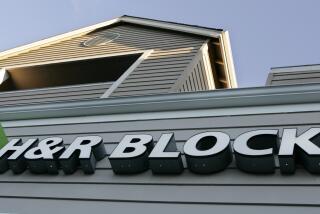Judge Says H&R; Block Suit Can Go Forward
- Share via
H&R; Block Inc. on Wednesday said it lost a bid for dismissal of a lawsuit on behalf of millions of customers who claim the world’s largest tax preparer plotted with bankers to gouge them on tax-refund loans.
U.S. District Judge Elaine Bucklo in Chicago found that a nationwide class of consumers can press claims that H&R; Block and its banking-services partner, Household International Inc., engaged in racketeering and conspiracy by charging excessive interest, sometimes exceeding 100%, to customers who borrowed against their tax refunds.
Kansas City, Mo.-based H&R; Block has been sued in at least six states, as well as in federal court, since 1992 over the program, which loaned customers money until their tax refunds arrived. An analyst reported in late 2002 the suits might cost the company as much as $2 billion.
“We’re extremely pleased because it means our case is going forward on the RICO count, which opens the door to treble damages,” said Michael Hyman, a Chicago lawyer representing H&R; Block customers.
RICO stands for the Racketeer Influenced and Corrupt Organizations Act of 1970.
Bucklo also dismissed breach of contract allegations and state-law claims that were contained in the federal class-action suit. Last year, she rejected as unfair to consumers a proposed $25-million settlement of the case.
H&R; Block said it was pleased that Bucklo dismissed the other claims. It also said consumers’ lawyers may have a difficult time proving the racketeering allegations. “We believe there is not the evidence to support it,” Nicholas Spaeth, general counsel for H&R; Block, said in the statement.
Mark Friedlander, a spokesman for Prospect Heights, Ill.-based Household International, a subsidiary of London-based HSBC Holdings, said Household clearly informs customers that a refund-anticipation loan is a loan and that other tax-refund options are available.
Bucklo also ruled that customers whose loan agreements included provisions requiring disputes to go to arbitration should be excluded. The decision will reduce the national class of about 20 million customers by about 5 million, said Steven Angstreich, a lawyer representing consumers.
Consumers’ lawyers say H&R; Block and Household officials preyed on low-income consumers by misleading them about interest rates on the tax-refund loans and charging exorbitant rates. H&R; Block has agreed to pay consumers in Texas and New York more than $33 million in cash and coupons to resolve suits over the loan program.
H&R; Block’s shares rose 32 cents Wednesday to $51.03 on the New York Stock Exchange.
More to Read
Inside the business of entertainment
The Wide Shot brings you news, analysis and insights on everything from streaming wars to production — and what it all means for the future.
You may occasionally receive promotional content from the Los Angeles Times.










